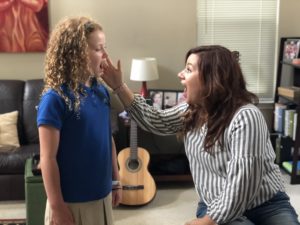written by Chelsea Nicole Smith, instructor at Metro Music Makers
So you’ve signed up for your first voice lesson! Yay!
Hold up, you just signed up for someone to come into your home and listen to you sing?! (insert freak-out emoji)
Well, yes, that would be correct. But my name is Chelsea, and I’m here to tell you that it’s really not that bad, and your first lesson doesn’t have to turn out to be the epic catastrophe you’ve created in your mind. At the beginning of this year, I went to all of my vocal students and asked them what their biggest questions and fears were when they first started lessons. Hopefully these questions and answers will encourage and equip you to succeed with your new voice teacher as you step into the voice lesson journey.
1. What to call me?
Say what?! Just call me Chelsea, or Miss Chelsea… Seriously, all of my voice teacher’s were called by either their first name, or Mrs. (insert first name). If you have a question about it, simply ask. Your new teacher will want to make you feel comfortable and create a connection with you on a personal level so you can have the best experience.
2. Do I need to have anything prepared?
It’s always good to have a song that you’ve sung in the past ready so I can hear you sing, but honestly, I know what you sound like after the first warm-up. Mostly, come into the lesson with an “I’ll try anything” attitude and you’ll rock it.
3. What do you do in lessons?
 Well, the simplest explanation is we warm-up and sing. Warm-ups by definition are exactly that, warm-ups. If you go into the gym, you can’t just start sprinting without stretching to warm up. You’ll pull something! Consider that the voice functions the same way. Some days you warm up and it’s horrible, some days you warm up and it’s awesome, the point is to get things awake and moving properly. The singing part is the scariest for most of us. But truly, I just want you to apply what we used in the warm-up to the song we’re singing. Technique is learned/taught in warm ups and applied in songs.
Well, the simplest explanation is we warm-up and sing. Warm-ups by definition are exactly that, warm-ups. If you go into the gym, you can’t just start sprinting without stretching to warm up. You’ll pull something! Consider that the voice functions the same way. Some days you warm up and it’s horrible, some days you warm up and it’s awesome, the point is to get things awake and moving properly. The singing part is the scariest for most of us. But truly, I just want you to apply what we used in the warm-up to the song we’re singing. Technique is learned/taught in warm ups and applied in songs.
4. Do I need to have a piano?
This is probably the golden question and the one I cannot stress the importance of enough. A solid, sound instrument functions like the independent variable to a dependent variable, your voice. Your voice depends on the sustainability of another instrument. In other words, if I can’t measure your voice to something then we’re just shooting arrows in the dark and hoping to hit the mark. YOU CANNOT MIMICK ME! I don’t do everything perfectly, and you definitely don’t have my voice. There is not another voice exactly like yours on the face of this planet. If you have a voice teacher not teaching with a piano or guitar, then you should look elsewhere.
Overall, my biggest advice is to come in with an excited attitude, an open mind that’s willing to change, and a brave heart that’s not afraid to try new and silly things. You’ll definitely enjoy your lessons more when you throw caution to the wind and trust your teacher upfront. I hope these answers ease your mind as you begin this exciting new journey!
All My Best,
Chelsea Nicole Smith
Vocal Pedagogue and Piano Instructor, MMM
M.M. Vocal Performance, GSU
B.M.E. Voice, Evangel University
